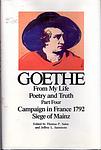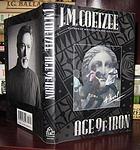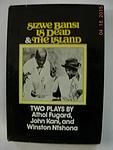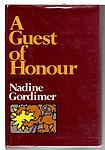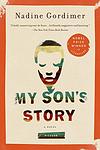The Greatest South African "Fiction" Books Since 1900
Click to learn how this list is calculated.
This list represents a comprehensive and trusted collection of the greatest books. Developed through a specialized algorithm, it brings together 300 'best of' book lists to form a definitive guide to the world's most acclaimed books. For those interested in how these books are chosen, additional details can be found on the rankings page.
Genres
Countries
Date Range
Reading Statistics
Click the button below to see how many of these books you've read!
Download
If you're interested in downloading this list as a CSV file for use in a spreadsheet application, you can easily do so by clicking the button below. Please note that to ensure a manageable file size and faster download, the CSV will include details for only the first 500 books.
Download-
26. Third World Express by Mongane Serote
"Third World Express" is a powerful and thought-provoking collection of poetry that explores the harsh realities of life in South Africa during apartheid. Through vivid imagery and evocative language, the author captures the struggles, hopes, and resilience of the marginalized communities, shedding light on the social and political injustices they face. With a blend of anger, sorrow, and determination, the poems in this book challenge the status quo and call for a more just and equal society.
-
27. This Life by Karel Schoeman
"This Life" is a reflective narrative that delves into the memories and experiences of an elderly South African woman as she nears the end of her life. Set against the backdrop of the 19th-century Boer society, the story unfolds through her introspective journal entries and letters, revealing the intimate details of her personal journey, her relationships, and the quiet struggles she endures. The novel poignantly explores themes of isolation, the passage of time, and the search for meaning, offering a contemplative look at the universal human condition through the lens of a solitary life lived amidst the vast landscapes of South Africa.
-
28. River God by Wilbur Smith
Set in ancient Egypt, the novel follows the life of Taita, a multitalented and highly intelligent slave, who serves a prominent household. Taita's story is one of love, war, and intrigue, as he uses his wit and skills to navigate the complex political landscape of the time. He is deeply devoted to his mistress, Lostris, and her lover, Tanus, and becomes embroiled in their secret affair. As Egypt faces threats both from within and from invading Hyksos forces, Taita's loyalty and ingenuity are put to the test. His journey is filled with adventure, as he seeks to protect his loved ones and ensure the survival of the kingdom's legacy.
-
29. Boyhood: Scenes from provincial life by J M Coetzee
"Boyhood: Scenes from Provincial Life" is a semi-autobiographical novel that explores the author's childhood in South Africa during the apartheid era. The narrative delves into the complexities of family dynamics, racial tension, and the struggle of a young boy trying to understand his place in a divided society. The protagonist grapples with his identity, torn between his Afrikaner heritage and his English schooling, while also navigating the trials of adolescence. The book offers a poignant and often painful reflection on the formative years of a boy growing up in a fraught and turbulent time.
-
30. Age Of Iron by J M Coetzee
In "Age of Iron," the narrative unfolds through the eyes of a terminally ill classics professor in apartheid-era South Africa. As she confronts her impending death, she forms an unlikely bond with a homeless alcoholic man. Through their interactions and the backdrop of a society rife with inequality and violence, the novel explores themes of morality, mortality, and the complexities of human relationships. The protagonist's personal journey is set against the harsh realities of an oppressive political system, offering a poignant reflection on the human condition and the struggle for dignity amidst chaos and decay.
-
31. Sizwe Bansi Is Dead by Athol Fugard
This play explores the harsh realities of apartheid in South Africa through the story of a black man who adopts a dead man's identity to improve his prospects. After being forced to leave his home in King William's Town due to restrictive work laws, he assumes the name and papers of a dead man named Sizwe Bansi, effectively erasing his own identity. The narrative unfolds in a photography studio, where he has come to have his picture taken with his new identity. Through this act, he grapples with the loss of his name and the complex issues of dignity, identity, and survival under an oppressive regime, revealing the personal cost of systemic racial injustice.
-
32. Collected Stories by Nadine Gordimer
The anthology brings together a rich tapestry of short stories that delve into the complexities of human relationships, moral dilemmas, and social injustices, particularly within the context of apartheid-era South Africa. The narratives, characterized by their nuanced exploration of personal and political themes, offer a window into the lives of diverse characters as they navigate the intersecting realms of race, class, and gender. Through her incisive prose and keen psychological insight, the author exposes the intricate and often harsh realities of life in a society riddled with systemic oppression, while also illuminating moments of resilience and the enduring capacity for human connection.
-
33. A Lesson From Aloes by Athol Fugard
Set in South Africa during the apartheid era, the play explores themes of friendship, betrayal, and the complex nature of loyalty. It revolves around a white liberal couple, Piet and Gladys, whose lives have been impacted by the political turmoil and racial injustices of the time. As they prepare for a dinner with their black friend Steve, who is about to emigrate to England, tensions rise and secrets are revealed. The aloe plants Piet obsessively tends to become a metaphor for resilience and survival, reflecting the characters' struggles with their personal and political realities. The narrative delves into the psychological and emotional costs of living under an oppressive system, and the strains it places on relationships and individual integrity.
-
34. A Guest Of Honour by Nadine Gordimer
"A Guest Of Honour" is a thought-provoking novel that delves into the complexities of political power and personal morality. Set in an unnamed African country, the story follows a British colonial administrator who is appointed as a temporary president after the country gains independence. As he navigates the murky waters of post-colonial politics, he is forced to confront his own beliefs and confront the consequences of his actions. The novel explores themes of identity, loyalty, and the clash between personal and political ideals.
-
35. My Son's Story by Nadine Gordimer
The novel revolves around Sonny, a colored schoolteacher turned activist in apartheid-era South Africa, who becomes as much a stranger to his family as he is a hero to the public. As Sonny's political involvement deepens, his family suffers from the consequences of his actions and the sacrifices they are forced to make. The story is narrated by his son, Will, who grapples with his father's legacy and the complex interplay of personal desires and political imperatives. The narrative explores themes of betrayal, love, and the personal costs of political commitment.
-
36. Foe by J M Coetzee
"Foe" is a novel that reimagines the classic tale of "Robinson Crusoe" through a postmodern lens, exploring themes of language, power, and colonialism. The story introduces a female character, Susan Barton, who finds herself cast away on the same island as Crusoe and Friday. Upon her return to England, she seeks out a writer to help tell her version of the events, but struggles with the erasure of her voice and the complexities of storytelling. The narrative delves into the silent history of Friday, whose tongue has been cut out, and the power dynamics between the characters, ultimately questioning the nature of truth and the ownership of stories.
-
37. Zoo City by Lauren Beukes, Philibert-Caillat Laurent Beukes Lauren
"Zoo City" by Lauren Beukes is a gripping urban fantasy novel set in a gritty Johannesburg where people who have committed a crime are magically bonded with an animal familiar. The story follows Zinzi December, a former journalist with a sloth on her back, as she becomes embroiled in a dangerous mystery involving a missing pop star and a dark conspiracy that threatens her newfound stability. With its unique blend of crime, magic, and social commentary, "Zoo City" explores themes of redemption, identity, and the consequences of our actions in a captivating and thought-provoking way.
-
38. Youth by J M Coetzee
"Youth" is a semi-autobiographical novel centered around a young man who leaves his homeland of South Africa for London in the 1960s, hoping to escape his oppressive and dull life. He seeks to immerse himself in the world of art and literature, yearning for a profound and transformative experience. However, he struggles to find his place in this new world, grappling with loneliness, unfulfilling jobs, and failed relationships. The book explores themes of alienation, the search for identity, and the disillusionment of youth.
-
39. Kruger's Alp by Christopher Hope
"Kruger's Alp" follows the journey of a South African everyman, a railway guard, who embarks on a trek across Europe to find the grave of Paul Kruger, a former president of South Africa. Along the way, he encounters a variety of characters and experiences that reflect on the history and politics of his home country, providing a satirical and insightful commentary on South African society during the apartheid era.
-
40. The Promise by Damon Galgut
This novel delves into the lives of a white South African family over several decades, tracing the country's transition from apartheid to democracy. At the heart of the story is a broken promise made to Salome, a black woman who works for the family, to gift her a house. This unfulfilled commitment serves as a metaphor for the broader societal promises of justice and equity that remain unkept. Through the lens of one family's complex dynamics, betrayals, and secrets, the narrative explores themes of guilt, racial tensions, and the struggle for redemption, reflecting on the challenges of reconciling with the past in a changing South Africa.
-
41. The Shining Girls by Lauren Beukes
This novel is a gripping thriller that intertwines the lives of a time-traveling serial killer and one of his survivors, who is determined to bring him to justice. Set against the backdrop of Depression-era Chicago, the narrative follows the killer as he uses a mysterious house to travel through time and target young women with bright futures—his "shining girls." After one victim survives a brutal attack, she embarks on a relentless quest to find her assailant, uncovering a trail of similar murders stretching across decades. The story masterfully blends elements of crime, horror, and science fiction, creating a chilling and suspenseful tale of resilience and retribution.
Reading Statistics
Click the button below to see how many of these books you've read!
Download
If you're interested in downloading this list as a CSV file for use in a spreadsheet application, you can easily do so by clicking the button below. Please note that to ensure a manageable file size and faster download, the CSV will include details for only the first 500 books.
Download


